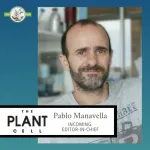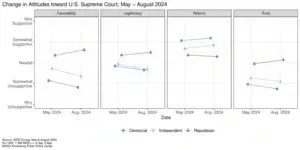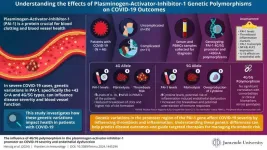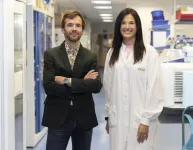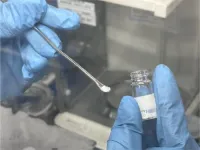(Press-News.org) The American Society of Plant Biologists (ASPB) is excited to announce Pablo Manavella will serve as the next Editor-in-Chief of The Plant Cell. The Plant Cell is a leading international society journal that publishes novel research of special significance in plant biology, especially in the areas of cellular biology, molecular biology, biochemistry, genetics, development, and evolution.
Manavella is currently a Consejo Superior de Investigaciones Científicas (CSIC) researcher at the Institute for Mediterranean and Subtropical Horticulture (IHSM) in Málaga, Spain. He is the Principal Investigator in a lab focusing on the intricate mechanisms regulating miRNA biogenesis and activity and how small RNAs shape chromatin organization. He was the recipient of the Career Development Award from the Human Frontiers Science Program (HFSP), led a Max Planck Partner Group abroad, and received the Carlos Berg Medal from the Argentine National Academy of Science.
“This position as Editor-in-Chief of The Plant Cell is more than simply a title; it is an incredible opportunity to define the future of plant scientific communication while leading what I consider the most prestigious journal in the field,” said Manavella on his recent appointment. “I'm excited to collaborate with the brilliant minds on our editorial board to make the journal more transparent, inclusive, and influential.”
Pablo’s vision for The Plant Cell under his editorship includes increasing dynamic communication and inclusivity while maintaining the journal’s high impact factor and rigorous peer-review process. He hopes to support authors and editors to ensure the journal remains a beacon of excellence and inclusion.
ASPB President Leann Thornton commented, “I am really excited to see Pablo Manavella take on the leadership of The Plant Cell. He has made important contributions to our understanding of plant small RNAs and other aspects of molecular genetics. The ASPB journals are integral to our mission of informing the plant biology community and promoting plant science research, and Pablo will bring useful experience and perspective to his job as the Editor-in-Chief.”
Manavella will begin his five-year term on January 1, 2025. He replaces current Editor-in-Chief Blake C. Meyers, whose five-year term concludes December 31, 2024.
Manavella added, “What truly motivates me is the opportunity to improve the publishing process, promote early-career academics, and increase the visibility of innovative research, all with the ultimate goal of helping our authors advance in their careers. I know it will not always be easy, but that is part of the fun! I'm ready for the challenge and thrilled to see where we can take The Plant Cell together.”
About ASPB
ASPB is a professional scientific association devoted to the advancement of the plant sciences worldwide. With a membership of some 3,000 plant scientists from throughout the United States and around the world, the Society publishes two of the most widely cited plant science journals, The Plant Cell and Plant Physiology, and co-publishes the open access journal Plant Direct. ASPB also hosts the annual Plant Biology conference; supports plant science outreach, engagement, and advocacy; and powers the Plantae digital ecosystem for plant scientists. Learn more about ASPB at https://aspb.org/.
END
Pablo Manavella appointed next Editor-In-Chief of The Plant Cell
2024-10-02
ELSE PRESS RELEASES FROM THIS DATE:
Unveiling genetic insights: how PAI-1 polymorphisms influence COVID-19 outcomes
2024-10-02
Despite global vaccination efforts, COVID-19 continues to pose significant risks, leading to severe complications and fatalities. These risks are driven by disrupted coagulation, impaired fibrinolysis, which is the process of breaking blood clots, and heightened inflammatory responses. The fibrinolytic system, crucial for maintaining balance within the coagulation cascade, relies on plasmin-mediated fibrin degradation. Plasminogen activators convert plasminogen into plasmin, an enzyme that breaks down ...
Redefining Publishing: PLOS receives multi-million-dollar grant funding for new research initiative
2024-10-02
SAN FRANCISCO —PLOS today announced that it has received a $1.5 million grant from the Robert Wood Johnson Foundation and a $1 million grant from the Gordon and Betty Moore Foundation to support our mission to drive Open Science forward with meaningful change in scholarly publishing. The funds enable PLOS to embark on an ambitious 18-month research and design project to explore how to tackle two barriers that exclude many researchers from meaningfully participating in Open Science: affordability ...
Planning a drug’s route in the body with synthetic chemistry
2024-10-02
Researchers at the RIKEN Cluster for Pioneering Research (CPR) have developed technology that can alter, within the body, the recognized identity of proteins. The innovation, published in Nature Communications on October 2, allowed researchers to target mouse tumors with a protein and then transport that protein out of the body. This means that cancer-killing drugs could be sent directly to tumors and then excreted from the body after dropping off their payload. The technology also has the potential to allow multi-purpose drugs that can travel from organ to organ, performing ...
Smoke from megafires puts orchard trees at risk
2024-10-02
Smoke From Megafires Puts Orchard Trees at Risk
Effects Last Months, Reducing Nut Crop Yields
By Amy Quinton | October 2, 2023
Long-term smoke exposure from massive wildfires lowers the energy reserves of orchard trees and can cut their nut production by half, researchers at the University of California, Davis, found. The smoke can affect trees for months after a megafire, depressing their bloom and the next season’s harvest. This finding reveals a new danger from wildfires that could affect plant health in both agricultural and natural environments.
Nature Plants published ...
Health Data Research UK and National Research Foundation Singapore formalize landmark partnership in health data science
2024-10-02
Health Data Research UK (HDR UK) and the National Research Foundation Singapore (NRF) are pleased to have signed a Memorandum of Understanding (MoU) today, that formalises a collaborative partnership in healthcare and data science. The partnership will leverage cutting-edge data science and research, with a focus on trustworthy data use to power improvements in healthcare, research and innovation, strengthening existing links between the UK and Singapore.
The MoU was signed by Permanent Secretary for National Research and ...
CNIO researchers propose a new treatment for brain metastasis based on immunotherapy
2024-10-02
CNIO researchers have discovered that cancer perverts certain brain cells, the astrocytes, and causes them to produce a protein that works in favour of the tumour.
A drug, silibinin, inhibits this protein, and could be used to help treat brain metastasis with immunotherapy. A clinical trial is underway.
The work is published in the American Association for Cancer Research's journal Cancer Discovery.
Researchers at the Spanish National Cancer Research Centre (CNIO) propose a new treatment for brain metastases that respond poorly, or not at all, to immunotherapy, and provide a biomarker to predict ...
Discovery of promising electrolyte for all-solid-state batteries
2024-10-02
Often overlooked, rechargeable batteries play an important part in contemporary life, powering small devices like smartphones to larger ones like electric vehicles. The keys to creating sustainable rechargeable batteries include having them hold their charge longer, giving them a longer life with more charging cycles, and making them safer. Which is why there is so much promise in all-solid-state batteries.
The problem so far is discovering which solid electrolytes offer such potential advantages.
In a step toward that goal, an Osaka Metropolitan University research group led by Assistant Professor Kota Motohashi, Associate Professor Atsushi Sakuda, ...
One-minute phone breaks could help keep students more focused in class and better in tests
2024-10-02
Phones can be useful tools in classrooms to remind students of deadlines or encourage more exchange between students and teachers. At the same time, they can be distracting: Students report using their phones for non-academic purposes as often as 10 times a day. Thus, in many classrooms, phones are not allowed.
Now, researchers in the US have investigated if letting students use their phones for very brief amounts of time – dubbed phone or technology breaks – can enhance classroom performance and reduce phone use.
“We show that technology breaks may be helpful for reducing cell phone use in the college classroom,” said Prof Ryan Redner, a ...
New study identifies gaps in menopause care in primary care settings
2024-10-02
CLEVELAND, Ohio (Oct 2, 2024)—Timely identification and treatment of bothersome hot flashes have the potential to improve the lives of many women and save employers countless days of related absenteeism and lost work productivity. Yet, a new study finds that such symptoms are often not documented in electronic health records (EHRs) or not adequately addressed during primary care visits. The study is published online today in Menopause, the journal of The Menopause Society.
Approximately 75% of women experience hot flashes as they go through the menopause transition. Despite the common occurrence of these bothersome ...
Do coyotes have puppy dog eyes? New study reveals wild canines share dog's famous expression
2024-10-02
New research from Baylor University reveals that coyotes, like domestic dogs, have the ability to produce the famous "puppy dog eyes" expression. The study – "Coyotes can do 'puppy dog eyes' too: Comparing interspecific variation in Canis facial expression muscles," published in the Royal Society Open Science – challenges the hypothesis that this facial feature evolved exclusively in dogs as a result of domestication.
The research team, led by Patrick Cunningham, a Ph.D. research student in the Department ...
